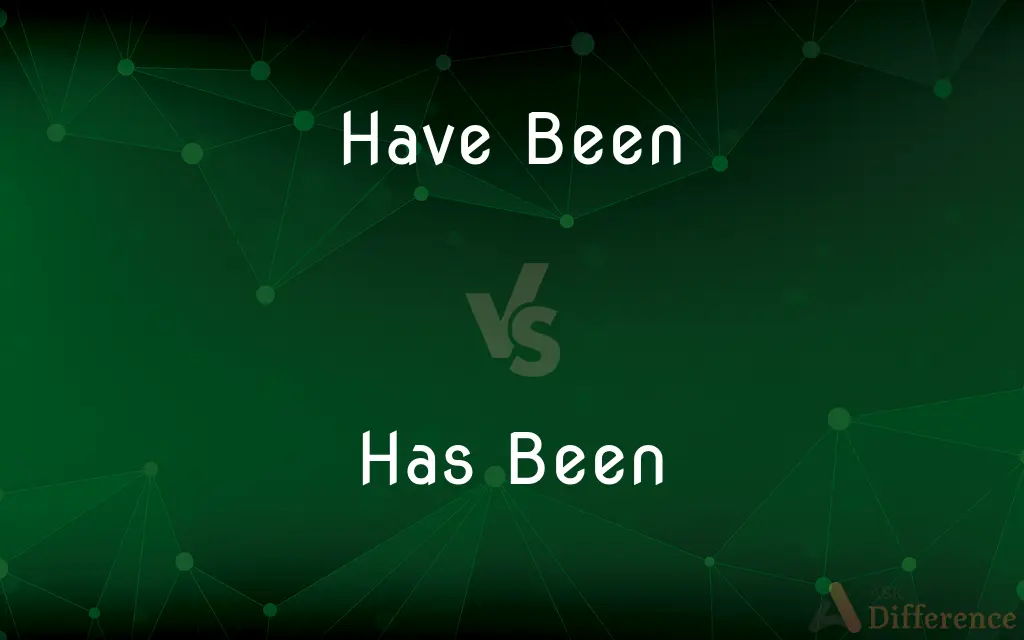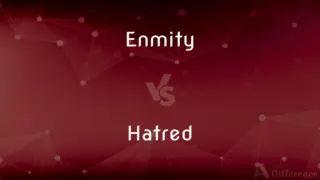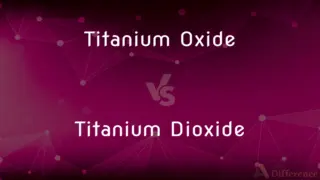Have Been vs. Has Been — What's the Difference?
By Tayyaba Rehman — Published on November 16, 2023
"Have been" is used with "I," "we," "you," and "they." "Has been" is used with "he," "she," and "it."

Difference Between Have Been and Has Been
Table of Contents
ADVERTISEMENT
Key Differences
Have Been and Has Been are both forms of the present perfect continuous tense, which indicate actions or states that began in the past and continue to the present or were happening recently. The difference lies in the subject they are paired with.
Have Been is the correct form to use with plural subjects like "we," "you," and "they," as well as the singular "I." For instance, "I have been reading," or "They have been working."
Conversely, Has Been is used with third person singular subjects, specifically "he," "she," and "it." Examples include "He has been running," or "It has been raining."
It's essential to choose between Have Been and Has Been based on the subject to ensure grammatical correctness. Misusing them can lead to sentences that sound awkward or are plainly incorrect.
Both Have Been and Has Been serve to emphasize the duration or continuous nature of an action. They are a part of the larger group of verb tenses that allow English speakers to convey when actions occur relative to the present.
ADVERTISEMENT
Comparison Chart
Subject Association
Used with "I," "we," "you," "they."
Used with "he," "she," "it."
Tense
Present perfect continuous.
Present perfect continuous.
Usage Example
"I have been studying."
"He has been studying."
Indicates
An ongoing action or state from past to present.
An ongoing action or state from past to present.
Grammatical Role
Helps form verb tenses with plural and "I" subjects.
Helps form verb tenses with third person singular.
Compare with Definitions
Have Been
Present perfect continuous tense form for multiple subjects or "I."
They have been playing soccer since morning.
Has Been
A verb form indicating continuous actions or states from the past to present for "he," "she," or "it."
She has been reading all afternoon.
Have Been
A phrase showcasing the continuity of an event.
We have been watching the show non-stop.
Has Been
A grammatical construct used with third person singular subjects to represent the duration of an action.
He has been working for three hours.
Have Been
A verb form indicating ongoing actions or states starting in the past and continuing to the present for "I," "we," "you," or "they."
We have been traveling across Europe.
Has Been
Present perfect continuous tense form for singular third person subjects.
It has been raining since morning.
Have Been
Signifies an action or situation that has been ongoing.
You have been making a lot of progress.
Has Been
A phrase emphasizing the continuity of an event for "he," "she," or "it."
It has been a long journey.
Have Been
A grammatical structure used with plural subjects or "I" to denote an action's duration.
I have been feeling unwell lately.
Has Been
Represents an ongoing situation or activity for third person singular.
She has been attending classes regularly.
Has Been
One that is no longer famous, popular, successful, or useful.
Has Been
(pejorative) A person, especially one formerly popular or influential, who continues in their field after their popularity or effectiveness has peaked and is now in decline.
Has Been
Someone who is no longer popular
Common Curiosities
When should I use "have been?"
Use "have been" with subjects like "I," "we," "you," or "they."
Is "has been" only used in the present perfect continuous?
While "has been" is a feature of the present perfect continuous, it's also used in the passive voice and present perfect.
Which is correct: "She have been" or "She has been?"
"She has been" is the correct form.
Which is correct: "They has been" or "They have been?"
"They have been" is the correct form.
Can "have been" and "has been" denote recently completed actions?
Yes, they can indicate actions that were ongoing but recently completed.
Can "have been" be used for a single person?
Yes, when the subject is "I."
Which indicates a longer duration: "He worked" or "He has been working?"
"He has been working" suggests a longer or ongoing duration.
How do I choose between "have been" and "has been?"
Base your choice on the subject of the sentence.
What's a common mistake with "have been" and "has been?"
Mismatching them with the wrong subjects is a common error.
Are "have been" and "has been" used in everyday conversation?
Yes, they are common in both spoken and written English.
Is it right to say "It have been raining?"
No, the correct form is "It has been raining."
Are "have been" and "has been" used in British and American English alike?
Yes, their usage is consistent in both British and American English.
Can I use "have been" and "has been" in passive voice?
Yes, as in "The letter has been sent."
Do "have been" and "has been" always denote continuity?
Mostly, but they can also show actions that were continuous but recently finished.
Is "He have been working" correct?
No, the correct form is "He has been working."
Share Your Discovery

Previous Comparison
Enmity vs. Hatred
Next Comparison
Titanium Oxide vs. Titanium DioxideAuthor Spotlight
Written by
Tayyaba RehmanTayyaba Rehman is a distinguished writer, currently serving as a primary contributor to askdifference.com. As a researcher in semantics and etymology, Tayyaba's passion for the complexity of languages and their distinctions has found a perfect home on the platform. Tayyaba delves into the intricacies of language, distinguishing between commonly confused words and phrases, thereby providing clarity for readers worldwide.














































